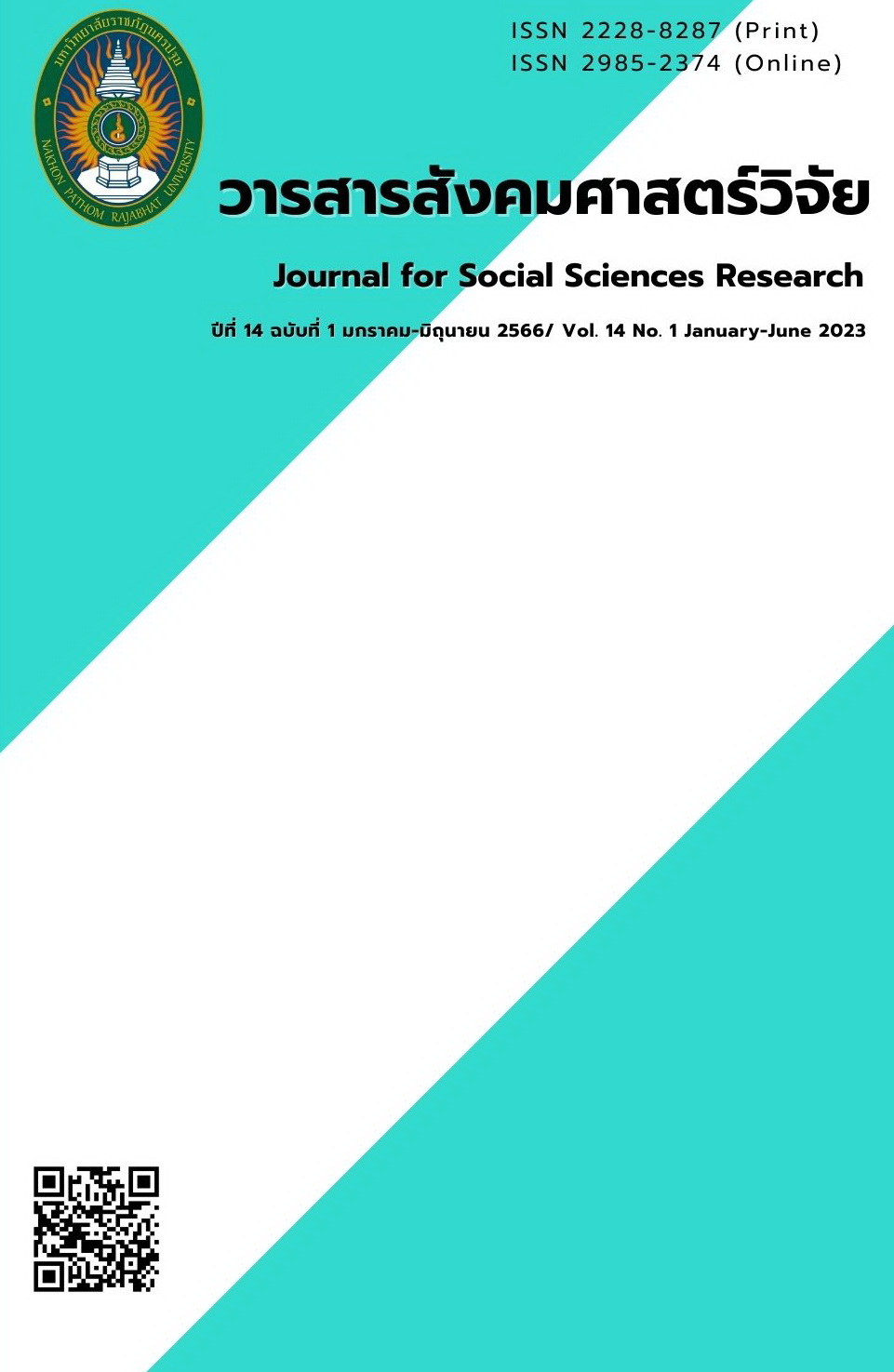THE GROWTH OF THE SUFFICIENCY ECONOMY PHILOSOPHY OF BHUTAN SOUL FARMERS LIVELIHOOD CENTER
Main Article Content
Abstract
The objectives of this study were to study 1) the adoption of the Sufficiency Economy Philosophy of the Bhutan Soul Farmers Livelihood Center (BSFLC); 2) the application of the Sufficiency Economy Philosophy in the BSFLC; and 3) the dissemination of the Sufficiency Economy Philosophy in the BSFLC. The key informants consisted of academics, government representatives, and members of civil society, 13 in Thailand and 6 in Bhutan, selected by the experts working on disseminating and applying the Sufficiency Economy Philosophy in Bhutan. Data were collected from document data, in-depth interviews, focus groups, and participant observation. The data collection instrument was a field note. The researcher established a typology and taxonomy of the data, as well as performed an analytical induction and componential analysis by comparing similarities and differences of the situations, then analyzed by description and explanation.
The research finding showed that: 1) the adoption of the Sufficiency Economy Philosophy of the BSFLC came from training and sending Bhutanese youth to study the Sufficiency Economy Philosophy Course in Thailand; 2) the application of the Sufficiency Economy Philosophy in the BSFLC started from founding an “Agri-nature farming” according to the 9 Steps of Sufficiency Economy Philosophy; and 3) the dissemination of the Sufficiency Economy Philosophy in the BSFLC was initiated by creating agri-nature networks, learning process, and conveying to the Sufficiency Economy Philosophy to the public.
Article Details

This work is licensed under a Creative Commons Attribution-NonCommercial-NoDerivatives 4.0 International License.
บทความที่ได้รับการตีพิมพ์เป็นลิขสิทธิ์ของมหาวิทยาลัยราชภัฏนครปฐม
เนื้อหาของแต่ละบทความเป็นทัศนะของผู้เขียน ซึ่งที่ปรึกษา บรรณาธิการ กองบรรณาธิการ และคณะกรรมการบริหารวารสารไม่จำเป็นต้องเห็นด้วย หรือร่วมรับผิดชอบใดๆ
References
กรมความร่วมมือระหว่างประเทศ กระทรวงการต่างประเทศ. (2561). SEP for SDGs Partnership. ค้นเมื่อ 28 กรกฎาคม 2564, จาก http://tica.thaigov.net/main/th/business/6296/70134-A1-SEP-for-SDGs-Partnership-A2-TICA.html
กาจฐิติ วิวัธวานนท์ และพจนา เทศวัฒนา. (2558). ตามรอย อ.เจฟฟรีย์ ฝรั่งสัญชาติไทยกับหลักปรัชญาเศรษฐกิจพอเพียง. ค้นเมื่อ 9 พฤศจิกายน 2565, จาก https://thaiembdc.org/th/2015/06/25/geoffreyl/
กุล ปัญญาวงศ์, ผู้อำนวยการศูนย์กสิกรรมธรรมชาติชุมชนต้นน้ำน่าน อำเภอท่าวังผา จังหวัดน่าน. (2564). สัมภาษณ์. 26 กุมภาพันธ์.
คณะอนุกรรมการขับเคลื่อนเศรษฐกิจพอเพียง สำนักงานคณะกรรมการการพัฒนาการเศรษฐกิจและสังคมแห่งชาติ. (2550). การประยุกต์ใช้หลักเศรษฐกิจพอเพียง. กรุงเทพฯ: คณะอนุกรรมการขับเคลื่อนเศรษฐกิจพอเพียง สำนักงานคณะกรรมการการพัฒนาการเศรษฐกิจและสังคมแห่งชาติ.
คณาจารย์คณะสัตวศาสตร์และเทคโนโลยีการเกษตร มหาวิทยาลัยศิลปากร วิทยาเขตสารสนเทศเพชรบุรี. (2564). สัมภาษณ์. 15 กุมภาพันธ์.
เจ้าหน้าที่กรมความร่วมมือระหว่างประเทศ. (2564 ก). สัมภาษณ์. 15 มีนาคม.
เจ้าหน้าที่กรมความร่วมมือระหว่างประเทศ. (2564 ข). สัมภาษณ์. 23 เมษายน.
ชาติลดา สหกิจ, อาสาสมัครเพื่อนไทย (Friends from Thailand) ในภูฏาน. (2564). สัมภาษณ์. 23 เมษายน.
ดรุณี โชติษฐยางกูร, คณบดีคณะเกษตรศาสตร์ มหาวิทยาลัยขอนแก่น. (2564). สัมภาษณ์. 18 กุมภาพันธ์.
ไทยพีบีเอส. (2560). ก้าวที่แกร่งแห่งความยั่งยืน. ค้นเมื่อ 5 กรกฎาคม 2564, จาก https://www.youtube.com/watch?v=M0AB2oMTpxQ
ไทยพีบีเอส. (2563). โซกิ ดอร์จิ หนุ่มภูฏานหัวใจไทย เดินตามรอยพ่อ: แสงจากพ่อสู่ความยั่งยืน. ค้นเมื่อ 28 มกราคม 2564, จาก https://www.youtube.com/watch?v=z8vho8xi6Uo
ไทยโพสต์ออนไลน์. (2560, 24 ตุลาคม). พระราชดำริ ข้ามทวีป สู่แดนไกลโพ้น. ไทยโพสต์ออนไลน์. ค้นเมื่อ 28 กรกฎาคม 2564, จาก http://tica.thaigov.net/main/contents/files/business-20171031-135746-263902.pdf
พระอาจารย์วีระยุทธ์ อภิวีโร, เจ้าอาวาสวัดป่าดงช้างแก้ว อ.สะเมิง จ.เชียงใหม่. (2564). สัมภาษณ์. 27 กุมภาพันธ์.
พระอาจารย์สังคม ธนปัญโญ, ผู้อำนวยการศูนย์กสิกรรมธรรมชาติจังหวัดสุรินทร์ อ.ศีขรภูมิ จ.สุรินทร์. (2564). สัมภาษณ์. 23 กุมภาพันธ์.
มติชนออนไลน์. (2560, 9 ตุลาคม). พระอัจฉริยภาพ “ร.9” โลกขานรับ “เศรษฐกิจพอเพียง”. มติชนออนไลน์. ค้นเมื่อ 18 กรกฎาคม 2563, จาก https://www.matichon.co.th/foreign/indepth/news_689782
วัชรพงษ์ วัฒนกูล, รองอธิการบดีมหาวิทยาลัยราชภัฏเชียงใหม่และผู้เชี่ยวชาญโครงการพัฒนาสินค้าและผลิตภัณฑ์ OGOP: One Gewog One Product ในภูฏาน. (2564). สัมภาษณ์. 23 เมษายน.
สำนักความสัมพันธ์ระหว่างประเทศ. (2556). ภูฏาน. ค้นเมื่อ 21 กรกฎาคม 2564, จาก http://www.bic.moe.go.th/index.php/component/k2/item/3028-2013-10-14-23-08-53
สำนักงานคณะกรรมการการพัฒนาการเศรษฐกิจและสังคมแห่งชาติ. (2550). ปรัชญาของเศรษฐกิจพอเพียง. กรุงเทพฯ: สำนักงานคณะกรรมการการพัฒนาการเศรษฐกิจและสังคมแห่งชาติ.
สำนักงานคณะกรรมการพัฒนาการเศรษฐกิจและสังคมแห่งชาติ. (2559). 29 พฤศจิกายน 2559 ครบรอบ 17 ปี พระบาทสมเด็จพระปรมินทรมหาภูมิพลอดุลยเดช พระราชทานปรัชญาของเศรษฐกิจพอเพียงสู่ความสุขอย่างยั่งยืนของคนไทย. ค้นเมื่อ 18 กรกฎาคม 2563, จากhttp://www.nesdb.go.th/ewt_w3c/ewt_news.php?nid=6280&filename=
สุทธิรัตน์ กิตติพงษ์วิเศษ, อาจารย์ประจำหลักสูตรสหสาขาวิชาสิ่งแวดล้อมการพัฒนาและความยั่งยืน จุฬาลงกรณ์มหาวิทยาลัย. (2564). สัมภาษณ์. 18 มีนาคม.
อภิชัย พันธเสน และคณะ. (2549). สังเคราะห์องค์ความรู้เกี่ยวกับเศรษฐกิจพอเพียง. กรุงเทพฯ: สำนักงานกองทุนสนับสนุนการวิจัย.
อะไลว. (2560). พระราชดำริไร้พรมแดน EP.9: สานสืบวิถีพอเพียงที่ภูฏาน. 5 สิงหาคม 2017. ค้นเมื่อ 31 พฤศจิกายน 2563, จาก https://www.youtube.com/watch?v=6F8UOnc8xEg&t=401s
อาบอำไพ รัตนภาณุ, ผู้ช่วยผู้อำนวยการศูนย์การเรียนกสิกรรมธรรมชาติมาบเอื้อง (โรงเรียนปูทะเลย์มหาวิชชาลัย) อาจารย์พิเศษ คณะศิลปศาสตร์ หลักสูตรผู้ประกอบการสังคม สถาบันอาศรมศิลป์. (2564). สัมภาษณ์. 2 กุมภาพันธ์.
Chen, H. (2015). An analysis of Bhutan’s gross national happiness. Seven Pillars Institute Moral Cents, 4 (2), 66-74.
Contipelli, E. & Picciau, S. (2020). Post-COVID-19: Rebuilding our paradigms through sustainable development goals and the sufficiency economy philosophy. New York: IndraStra Global.
Dukpa, L., The Director of Bhutan Soul Farmers Livelihood Center (BSFLC) Paro, Bhutan. (2021). Interview. 9 April.
Mongsawad, P. (2010). The philosophy of the sufficiency economy: A contribution to the theory of development. Asia-Pacific Development Journal, 17 (1), 123-144.
Samal, P. (2018, September 1). Soulful self-sufficiency. Press Reader. Retrieved 25 May 2020, from https://www.pressreader.com
Samal, P. (2018, September 24). Bhutan Soul Farmers aims to be a model of soulful self-sufficiency in the country. Daily Bhutan. Retrieved 25 May 2020, from https://dailybhutan.com/article/bhutan-soul-farmers-aims-to-be-a-model-of-soulful-self-sufficiency-in-the-country
The Nation Thailand. (2018, May 28). HRH Princess Sirindhorn in “highest-profile” visit to Bangladesh. The Nation Thailand. Retrieved 20 January 2021, from https://www.nationthailand.com/breakingnews/30346412
Ura, D. K., Alkire, D. K. S. & Zangmo, T. (2011). Happiness index of Bhutan: Method and illustrative results. Oxford: The Centre for Bhutan Studies.
Virtual depots. (2008). Sufficiency economy in global view: Gross national happiness. Retrieved 25 May 2020, from http://www.virtualdepots.com/sufficiency/images/thinley-en.jpg
Wangmo, L., The Staff of Bhutan Soul Farmers Livelihood Center (BSFLC) Paro, Bhutan. (2021). Interview. 22 May.


